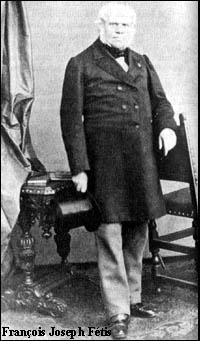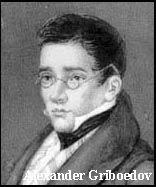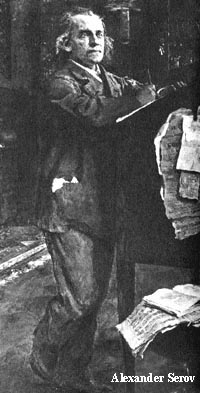By Elena Dolenko
© 2003 Elena Dolenko
My contribution is not intended to provide a comprehensive survey of every mention of Berlioz in the Russian press between 1833 and 1869, although it would be most desirable to have such a survey available. I have often thought of compiling one eventually, especially since there are still some gaps in studies concerning Berlioz in Russia and his relations with the country, gaps that need to be filled sooner or later. Besides, very few Berliozians nowadays can boast of their command of the Russian language.
My work on the subject is not at present complete, and therefore the paper I am privileged to present here should be taken rather as a kind of introduction to a forthcoming survey of what was written and published about Berlioz in the Russian press of his time. I only wish I could have my survey ready by the end of this very special year for all of us, the year of Berlioz’s bicentenary.
So, what is the subject of this contribution? I suppose it is generally known that in Berlioz’s lifetime the Russian press paid constant attention both to him and to his music. But how sustained was this attention? I raise this question here, for one could hardly imagine something less sustained than the attention of the press. Nevertheless, a historical examination of the articles I have studied offers an insight into the evolution of Berlioz’s reception by the Russian public and by the press as well. It was also interesting to learn that various genres of music criticism did play different roles at different times. My paper will discuss all these points, though I would like to begin with a different one.
A prophet has no honour in his own country.1
As Hans Gal asserted, these words from the Gospel could have been invented for Hector Berlioz.
Never truly recognised in his native country, at best tolerated, largely ignored, he [Berlioz] had to find his rare successes abroad – in Germany, Austria, Russia, England – and whatever he was able to produce in Paris, where he lived, was a flash in the pan.2
The insults heaped on Berlioz by Pierre Scudo, the contemporary French critic of Italian origin, seem to support Gal’s point. Without pulling any punches, Scudo claimed in 1846 in the Revue indépendante:
Not only does M. Berlioz not have any melodic ideas, but when one occurs to him, he does not know how to handle it, for he does not know how to write. We say M. Berlioz does not know how to write, that is, he cannot deduce from a melodic idea all the consequences that it entails.3
And elsewhere he added:
Berlioz couples instruments that howl when they are forced together; he thunders, he rages without lightning and without storm... M. Berlioz is bizarre and ill-ordered, because he lacks inspiration and knowledge; he is violent, because he has no good reasons to offer; he wishes to stun us, because he does not know how to charm us. The science of Monsieur Berlioz is an abstract science, a sterile algebra. Without melodic ideas and without experience in the art of writing, he plunges into the extraordinary, into the gigantic, into the incommensurable chaos of a sonority that irritates and shatters the listener without satisfying him... There is nothing in these strange compositions but noise, disorder, a sickly and sterile exaltation. He gasps, he prances, he fidgets, he behaves like a demon disinherited of divine grace who wants to scale the heavens by force of pride and will.4
However, the contrast drawn by Hans Gal between a favourable reaction to Berlioz’s music abroad and incomprehension in France is excessive: the reaction abroad was not consistently favourable. To support this statement, it is worth quoting below some critical remarks on Berlioz by foreign journalists published in periodicals in Boston, London and Brussels, both in the composer’s lifetime and shortly after his death.
The critical remarks that appeared in the Boston Daily Advertiser of 29 October 1874, five years after Berlioz’s death, are a fairly representative example of such criticisms:
Berlioz is, in our opinion, by far the least respectable of the composers of the new school... He has no breath of inspiration and no spark of creative genius... A knowledge of the principles of composition will no more make a composer than an acquaintance with etymology a poet... It needs no gift of prophecy to predict that he will be utterly unknown a hundred years hence to everybody but the encyclopedists and the antiquarians.5
And here is an excerpt from a London periodical, the Dramatic and Musical Review of 7 January 1843:
Berlioz, musically speaking, is a lunatic; a classical composer only in Paris, the great city of quacks. His music is simply and undisguisedly nonsense. He is a kind of orchestral Liszt, than which I could name nothing more intensely disagreeable.6
The last quotation comes from François Joseph Fétis’s book, Biographie Universelle des Musiciens published in 1837 in Brussels, in which he noted in passing:
passing:
His [Berlioz’s] rare melodies are deprived of meter and rhythm; and his harmony, a bizarre assemblage of sounds, not easily blended, does not always merit this name. I believe that what Monsieur Berlioz writes does not belong to the art which I customarily regard as music and I have the complete certainty that he lacks the prerequisites of this art.7
The source from which I borrowed the above critical ‘attacks’ on Berlioz is the Lexicon of Musical Invective, compiled by Nicolas Slonimsky, an American musicologist of Russian origin (the translations have been slightly adapted in a few places). Slonimsky’s Lexicon is a collection of critical assaults on composers since Beethoven’s time. One of its special features is the Invecticon, an index of invectives from ‘Aberration’ to ‘Zoo’. It is an accepted commonplace that works now acknowledged as masterpieces were once considered monstrosities of ugliness. It is however interesting to note what this unusual Lexicon reveals, viz. that the bad press received by the music of such dissimilar composers as, for example, Berlioz, Liszt and Richard Strauss was surprisingly similar.
Compared with the above quotations, the reviews by Russian critics and journalists who unanimously heap praise on the music of the French master look even more impressive. Having studied over two hundred articles dedicated to Berlioz and his music, published in Russian newspapers and journals in Russian, German and French from 1833 to 1869 (i.e. from the earliest press coverage of Berlioz’s music, fourteen years before he arrived in Russia for the first time, to the notices of his death), I can state that the number of publications whose tone was unfavourable can be counted on the fingers of one hand.8
An insight into the reception of Berlioz’s music in Russia is provided by the following quotation from an article published before the first performance of Berlioz’s Requiem in St. Petersburg on 1 March, 1841:
In Germany Berlioz’s works are being performed along with those of great composers, while none of his compositions have been known to us so far. We are grateful to Monsieur Romberg in advance for the delightful experience we are sure to have.9
Six years later the following announcement appeared in the paper Russkij Invalid:
A highly enjoyable experience is being prepared for the public of St. Petersburg. Hector Berlioz whose name will be inscribed in golden letters in the history of music, a composer of renown and a recognised music critic, will give a concert on Monday, March 3, in the Hall of the Nobility (Zal Dvoryanskogo Sobranija). The programme promises to be the triumph of the great...10
In both cases the critics referred to or made comments on music they had never heard before and did so even before the composer’s first visit to Russia. This raises a number of questions: What was the origin of this feeling of gratitude for anticipated enjoyment by the critics? What was the background of their highly favourable attitude towards Berlioz, and what were its consequences?
The answer might lie in the critical genre to which the articles I alluded to belong. This genre, namely the announcement, displays a priori a favourable attitude to the subject it deals with, for it is intended both to announce an artistic event and to advertise it. Much the same as an advertisement, an announcement seeks to create a favourable presumption for its subject, since the point of any announcement is not just to draw attention to an event, but also to arouse curiosity, to fascinate and thus to get the reader interested in the event.
But the issue goes beyond the question of genres in music journalism. The point of raising the above questions is also to expose the
perception of art as a  politically-engaged system with its own laws, which involve state patronage and the state appointed “outsiders”. In the period from the 1820s to the 1840s, everything that was French was encouraged and made fashionable. No wonder, then, that the Russian mass media in the 1840s hastened to consider the first performance of Berlioz’s Requiem as something to be highly appreciated. This statement, however, does not mean that one should dismiss as insincere all the enthusiastic reviews published later by the
politically-engaged system with its own laws, which involve state patronage and the state appointed “outsiders”. In the period from the 1820s to the 1840s, everything that was French was encouraged and made fashionable. No wonder, then, that the Russian mass media in the 1840s hastened to consider the first performance of Berlioz’s Requiem as something to be highly appreciated. This statement, however, does not mean that one should dismiss as insincere all the enthusiastic reviews published later by the same critics, along with the reception Berlioz generally met in Russia. Nevertheless, one cannot help realising that the background to a
favourable attitude towards Berlioz’s music in Russia was in place in advance of its performance.
same critics, along with the reception Berlioz generally met in Russia. Nevertheless, one cannot help realising that the background to a
favourable attitude towards Berlioz’s music in Russia was in place in advance of its performance.
“In advance” here implies approximately the 1820s, soon after theNapoleonic War, when the patriotic feelings of the Russians gave way to their passion for everything foreign. It was, incidentally, the same time that, by a curious coincidence, two classical works of Russian literature appeared almost simultaneously: Eugene Onegin (Evgenij Onjegin) by Alexander Pushkin and Distress from Cleverness (Gore ot Uma) by Alexander Griboedov.
Let me quote two extracts from Eugene Onegin which might be helpful in revealing the background of Berlioz’s appreciation in Russia.
The first of them reads as follows:
Your curiosity is burning
To hear what latest modes require,
And so, before the world of learning,
I could describe here his attire;
And though to do so would be daring,
It’s my profession; he was wearing –
But pantaloons, waistcoat, and frock,
These words are not of Russian stock:
I know (and seek your exculpation)
That even so my wretched style
Already tends too much to smile
On words of foreign derivation,
Though years ago I used to look
At the Academic Diction-book.11
And here is the second one:
I see another problem looming:
To save the honour of our land
I must translate – there’s no presuming –
The letter from Tatyana’s hand:
Her Russian was as thin as vapour,
She never read a Russian paper,
Our native speech had never sprung
Unhesitating from her tongue,
She wrote in French... What a confession!
What can one do? As said above,
Until this day, a lady’s love
In Russian never found expression,
Till now our language – proud, God knows –
Has hardly mastered postal prose.12
The passage below comes from Alexander Griboedov. The main character of his Distress from Cleverness, Alexander Tchatsky seeks, though in vain, to draw the public’s attention to the miserable passion of the Russians for everything that is foreign.
Tchatsky:
An incident I chanced on in that room.
A Frenchman from Bordeaux was drawing his attention
Of quite a numerous crowd to whom
He held forth on the tears and apprehension
With which he packed his things when out of France he set
To the barbarians, to Russia; but he met
No end of kindness here; nay, never marked a single
Russ face or word; he seems to be at home, to mingle
With his own countrymen. So it’s no wonder that
At balls he, like a king, reigns, pleased and self-contented;
Like in his native land the ladies dress and chat...
He’s glad, but we resent it.
His speech at end, from all around
Deep sighs and cries of envy sound:
“Oh, France, there is no country like it, truly!”
The sisters-princesses declared, repeating duly
What from their childhood they always have been taught.
In vain escape from them I sought.13
Dr. Stuart Campbell is quite right to point out that “the Russian public encountering Berlioz for the first time did so within a wide cultural context which embraced Flaubert, Hugo, Sardou and Sue as well as Adam, Delibes and Halévy.”14 In my turn, I would just like to add: which embraced France as a cultural and political image of the new and progressive with all the implications inherent in an image. And it was the effect of this image that motivated the steps taken by Russian critics who had praised Berlioz’s music to the sky without having heard it.
Indicative too is the very beginning of the critical literature on Berlioz in Russia. It was Berlioz’s compatriot Joseph d’Ortigue who was (presumably) the first to write on Berlioz in the Russian press. In 1833 the Teleskop published the translation of his essay from the Revue étrangère under the heading Famous Contemporaries.15
 Up to 1841 any mention of Berlioz in the press was quite often under the headings Miscellanea, Paris Chronicle and News from Abroad. Foreign journals were at that time the main source of information concerning Berlioz and his music, – predominantly the German ones, since the German press, according to Faddei Bulgarin, the editor of the Severnaya Pchela, “is more trustworthy, for German musicologists are not generally willing to
praise Italian or French music”.16
Up to 1841 any mention of Berlioz in the press was quite often under the headings Miscellanea, Paris Chronicle and News from Abroad. Foreign journals were at that time the main source of information concerning Berlioz and his music, – predominantly the German ones, since the German press, according to Faddei Bulgarin, the editor of the Severnaya Pchela, “is more trustworthy, for German musicologists are not generally willing to
praise Italian or French music”.16
Virtually all Berlioz’s first performances after 1835, including the Requiem, Benvenuto Cellini and Roméo et Juliette, became subjects for discussion in the Russian press. Here, for example, is an excerpt dated 1838, where the reviewer of the journal Bibliotheka dlya Chteniya considers the performance of Benvenuto Cellini as follows:
This absolutely useless dramatic character joins the others in this equally useless opera; for the libretto, however, I don’t care at all. But I am perplexed why this opera’s music should concern me so greatly; it might be because the composer submits very clever articles to the Journal des Débats which I always enjoy reading.17
In 1841 the genre of the chronicle gave way to the review. The reason for that was the first performance of Berlioz’s Requiem in Russia under Henri Romberg. The performance is known to have been a great success and the press responded immediately. Prince Vladimir Odoevsky, who chose to sign his enthusiastic article as a “music lover”, did not restrict himself to making superficial comments on the music he had encountered for the first time. He claimed Berlioz’s music to be something stupendous, especially with regard to instrumentation. This was the article in which Odoevsky offered one of the first analyses of the Requiem’s instrumentation.18 Later on Berlioz’s instrumentation attracted other Russian critics as well. Sometimes rather amusing things would also appear in the reviews, such as in the following quotation from Russkij Invalid:
One has to be the Dalai Lama or Gengis Khan to remain indifferent to this fresh, original and daring instrumentation which is utterly unknown in earlier music.19
Incidentally, one of the unfavourable reviews on Berlioz in the Russian press of that time was also a response to the first performance of the Requiem.20
In the course of the following five years the coverage of the news on Berlioz in the Russian press was rather poor, and was found largely in the Paris Chronicle and Miscellanea sections. And it was not until 1847 that the name of Berlioz appeared on the front pages of all the papers and magazines, since it was the year the composer arrived in Russia, and the press consequently became the most important source of historically authentic information concerning his stay. Not only did the programmes of his concerts evoke great interest (they were announced by the regular papers), but all the conceivable ins and outs of his stay were also considered newsworthy. Here is an excerpt:
The famous composer Berlioz, well known in Europe, is really enjoying himself in Russia. Everybody is eager to invite him to dinner; those at the last gasp rise from their death beds to have a look at him. The hosts feel highly honoured by his company and are keen to feed him. Every memory about him is treasured, including his mots and even the orange peel he leaves on his plate.21
It was the genre of reportage that became particularly popular at that time, since it was justly regarded as the most effective: it suggested both that the event reviewed was of extraordinary quality, and that it was urgent that it should be covered. The postscript to one of Prince Odoevsky’s articles in the Sankt-Peterburgskie Vedomosti included the following remark, which is revealing in this respect: “written at midnight. March 3, 1847”. This was the date when the Berlioz’s first concert took place in St. Petersburg. Prince Odoevsky’s reportage on that concert appeared as early as March 5. That was probably the most unusual of all the reports written on Berlioz in Russia. Influenced by Robert Schumann’s critical writings, Odoevsky wrote his reportage as an open letter to Mikhail Ivanovich Glinka. Berlioz was known to have shown interest in Glinka’s music, and that had apparently been the reason why Odoevsky wrote such an unusual article. Incidentally, Odoevsky concluded his announcement of the first Berlioz concert in Russia with the remark: “Berlioz was one of the precious few who investigated Glinka’s music”.22
Here is a passage from Odoevsky’s reportage addressed to Glinka:
Where are you, my dearest friend? Why aren’t you here sharing enjoyable experiences with all our friends who have at least some feeling for music? Berlioz was accepted here! This, indeed, is already undeniable. He was accepted in spite of the high sophistication of his counterpoint; in spite of the flood of Italian melodies in modern music which have left their mark, in that they have spoiled our native Slavic musical feeling, which is admittedly somewhat austere; in spite of our music critics who have contributed nothing to our musical education but rather proved to be misleading. I have always believed in our public and the deep feeling it has for music. And I shall carry on doing so, though our so-called critics dared to write complete nonsense on your operas, and were unable to tell harmony from melody and a sharp from a flat. But my intuition did not deceive me. The audience was delighted by your original melodies and did not care for the critics imposing their views upon the listeners. [...] With the same innocent, sincere delight the public succumbed to the effect of Berlioz’s music.23
Significantly, while defining the genre of their critical writings on Berlioz, Russian critics, including Prince Odoevsky, made use of the word “feuilleton”. This usage requires comment, because nowadays the word “feuilleton” as a genre of criticism implies in Russian first and foremost an ironical stance on the part of the author towards the event he is reviewing. This was incidentally a feature characteristic of some of Berlioz’s feuilletons as well.
However, the word “feuilleton” had a different meaning for the Russian press at that time. Any article placed on the paper’s front page, and characterised by unconventional and highly original language, would generally be considered as a “feuilleton”. The inspiring effect of Berlioz’s music on Russian critics manifested itself in a great number of feuilletons written not only in prose but also in poetic form.24
When Berlioz left Russia for France, the Russian press set about publishing documentary and biographical evidence on the composer’s life. Thus, as early as August 1847 in the Sankt-Peterburgskie Vedomosti, there appeared a translation of Berlioz’s letters to Humbert Ferrand with an account of the composer’s musical activities in Austria, Russia and Prussia.25 The letters were first published in Russia in Russian translation, and only a few weeks later appeared in French in La Russie musicale.26
 In 1858 the Teatralnyi i Musykalnyi Vestnik published Letters from Abroad by Alexander Serov, who not only attended Berlioz’s concerts in Baden-Baden, but also got to know the composer personally and then hastened to share his impressions with his readers.27
In 1858 the Teatralnyi i Musykalnyi Vestnik published Letters from Abroad by Alexander Serov, who not only attended Berlioz’s concerts in Baden-Baden, but also got to know the composer personally and then hastened to share his impressions with his readers.27
Throughout this period, Berlioz’s activities were constantly covered in the Russian press. The most significant of his concerts, premières and publications were immediately reported to Russian readers, many of whom deeply admired Berlioz.
In 1869 a moving episode occurred in St. Petersburg and the Sankt-Peterburgskie Vedomosti did not fail to record it immediately:
Recently there have been reports in our press reprinted from a German paper that Berlioz is seriously ill. Now we are glad to reassure those of our readers who are so concerned for the life of this genius. Recently the most zealous of Berlioz’s admirers sent him a telegram asking for information about his health. Berlioz replied: “Many thanks, I feel much better now”.28
Since my paper focuses mainly on the reflections of Berlioz in the Russian press of the first half of the XIXth century, I have to leave aside some important questions concerning Berlioz’s second trip to Russia. As a result, my report about the reception of Berlioz’s œuvre in the Russian press in the 1850s and 1860s is quite brief.
In 1867 the composer paid his second and last visit to Russia. The press was again highly enthusiastic. This time, however, the admiration was caused not so much by the public’s passion for everything French (which, incidentally, gave way to a passion for everything German), but rather by Berlioz’s music itself and by his truly outstanding personality. An indication of this is provided by an extract from a review in the paper Vest’, dated 1867. One hardly could imagine such a review being published 20 years earlier:
The performances of Berlioz’s three operas were not very successful in Paris. True, but Wagner’s Tannhäuser had no success there either. Paris is a far less musical city than St. Petersburg. […] The orchestra of Paris Conservatoire was, indeed, once famous for its unrivaled performance of Beethoven’s symphonies. It was the best orchestra in Europe! That was, however, in the reign of Charles X. I attended the unforgettable concerts under Habeneck, which were called in Paris the Fêtes Beethovéniennes. But now the picture is quite different. And though I still feel nostalgia for the Paris of that time, which seemed to be as distant as Peking and which one can now reach in three days, I assure the reader that, judging by the performances of Beethoven’s Pastoral Symphony and Weber’s overture to Oberon, our Musical Society’s orchestra under Berlioz was in no way inferior to that of the Paris Conservatoire in its heyday under Habeneck.29
In 1867 Berlioz encountered quite a different Russia. Some of the critics who had covered his first Russian tour were no longer alive (such as Faddei Bulgarin or Nikolai Mel’gunov). Prince Odoevsky had given up his journalistic career. Berthold Damcke had left for Paris. It was the critics of another generation – Alexander Serov, Zesar’ Cui and Hermann Larosh – who now came to the forefront.
Berlioz himself was also far from being the same man. Even his appearance had changed strikingly. Here is the description of his appearance given in one of the Russian papers of that time:
Once can hardly imagine a man of 64 capable of showing such an intensity of feeling in conveying the deep suffering and frustrated hopes which are known to be inevitable in the life of an artist. His fine features, distorted by suffering, show the bitterness caused by the pain and miseries he has been through, by the tragic death of his only, very talented son.30
In conclusion, let me quote from Samuel Butler: “The only things we really hate are unfamiliar things”. However, judging from the reception Berlioz enjoyed in the Russian press, this does not seem to be true at all.
To emphasize one further point, I would like to cite in remembrance a consolatory rhyme by Sir Arthur Conan Doyle:
Critics kind – never mind!
Critics flatter – no matter!
Critics blame – all the same!
Do your best – damn the rest!
Given the composer’s attitude towards the Russian press, which was known to be highly enthusiastic, Berlioz could apparently have added:
Critics laud – bless them, God!
And that seems to be more than just a paraphrase, since, as it is said in the Gospel, “Whoever insults his brother shall be liable to the council, and whoever says, ‘You fool!’ shall be liable to the hell of fire.”31
Elena Dolenko
_____________________________
Notes:
* An earlier version of this paper was presented at the “Interpreting Berlioz” conference, London, 15-17 November 2002.![]()
1. John: 4; 44.
Cf.: Matthew: 13; 57: And they took offense at him. But Jesus said to
them, “A prophet is not without honour except in his own country and in his
own house.”
Mark: 6; 4: And Jesus said to them, “A prophet is not without honour,
except in his own country, and among his own kin, and in his own house.”
Luke: 4; 24: And he said, “Truly, I say to you, no prophet is acceptable in his own country.”![]()
2. Hans Gal, [Preface], in Marion Linton, Hector Berlioz. Exhibition Drawn from the Cecil Hopkinson Berlioz Collection,
Edinburgh: National Library of Scotland, 1969, p. 5.![]()
3. See: Nicolas Slonimsky [ed.], Lexicon of Musical Invective, 2 N.Y.: Colemann-Ross, 1965, p. 58.![]()
8. See among them: “Miscellanea. Bibliographic and Musical News”, in Sankt-Peterburgskie Vedomosti, #57, March 12, 1841, p. 252-254.![]()
9. “Musical News”, in Sankt-Peterburgskie Vedomosti, # 47, February 28, 1841, p. 210.![]()
10. “Hector Berlioz’s Concert”, in Russkij Invalid, # 44, February 26, 1847, p. 173.![]()
11. Alexander Pushkin, Eugene Onegin, translated by Charles H. Johnston, Harmondsworth: Penguin, 1979, p. 46.![]()
13. Alexander Griboedov, Distress from Cleverness, translated by Beatrice Yusem, N.Y.: Effect Publishing, Inc., 1993, p. 175.![]()
14. Stuart Campbell, Berlioz as a Representative of Contemporary French Culture in Russia [Paper presented at the “Interpreting Berlioz” conference, London, 15-17 November 2002].![]()
15. Joseph d’Ortigue, «Hector Berlioz», in Revue étrangère, t. 5, janvier, 1833, p. 42-57. In French. See also: Joseph d’Ortigue, “Hector Berlioz”, in Teleskop, # 10, v. 15, 1833, p. 239-250. In Russian.![]()
16. Faddei Bulgarin, “Notes, Extracts, Correspondence”, in Severnaya Pchela, # 63, March 19, 1847, p.249-251.![]()
17. “French Theatre in Paris. Benvenuto
Cellini”, in Bibliotheka dlya Chteniya, v. 30, October, 1838, p. 80.![]()
18. See: Music Lover [Ljubutel’ musyki], “Berlioz’s Requiem in the Concert under M. Romberg”, in Sankt-Peterburgskie Vedomosti, # 48, March 1, 1841, p. 214.![]()
19. “Feuilleton. St. Petersburg’s
Chronicle”, in Russkij Invalid, # 50, March 5, 1947, p. 198.![]()
21. K.D.S. [E.I. Guber], “Feuilleton. St. Petersburg’s Chronicle”, in Sankt-Peterburgskie Vedomosti, # 61, March 16, 1847, p. 280.![]()
22. K.V.O. [Prince Vladimir Odoevsky], «Berlioz in Petersburg», in Sankt-Peterburgskie Vedomosti, # 49, March 2, 1847, p. 225![]()
23. K.V.O. [Prince Vladimir Odoevsky], “Berlioz’s Concert in Petersburg (Letter to M.I. Glinka)”, in Sankt-Peterburgskie Vedomosti, # 51, March 5, 1847, p.255.![]()
24. See: Ch., «Un drame inconnu», Severnaya Pchela, # 63, March 19, 1847, p. 249-251.![]()
25. See: Sankt-Peterburgskie Vedomosti, ## 190 &191, August 22 & 23; ## 204 & 205, September 9 & 10; ## 239 & 240, October 19 & 21, 1847.![]()
26. See: Hector Berlioz, “Voyage musical en Autriche, en Russie et en Prusse par Hector Berlioz à M. Humbert Ferrand”, in La Russie musicale, # 36, 4 septembre; # 37, 11 septembre; # 47, 2 novembre; # 48, 27 novembre; # 49, 4 décembre; # 50, 11 décembre; # 51, 18 décembre, 1847.![]()
27. See: Alexander Serov, “Letters from Abroad”, in Teatralnyi i Musykalnyi Vestnik, # 42, October 26, 1858; # 43, November 2, 1858.![]()
28. “Chronicle”, in Sankt-Peterburgskie Vedomosti, # 54, February 23, 1869, p. 2.![]()
29. * *
* “Feuilleton. Berlioz in St. Petersburg”, in Vest’, # 134, November 22, 1867, p. 1. [This Russian critic would rather sign his article with three asterisks than his name E.D.]![]()
![]()